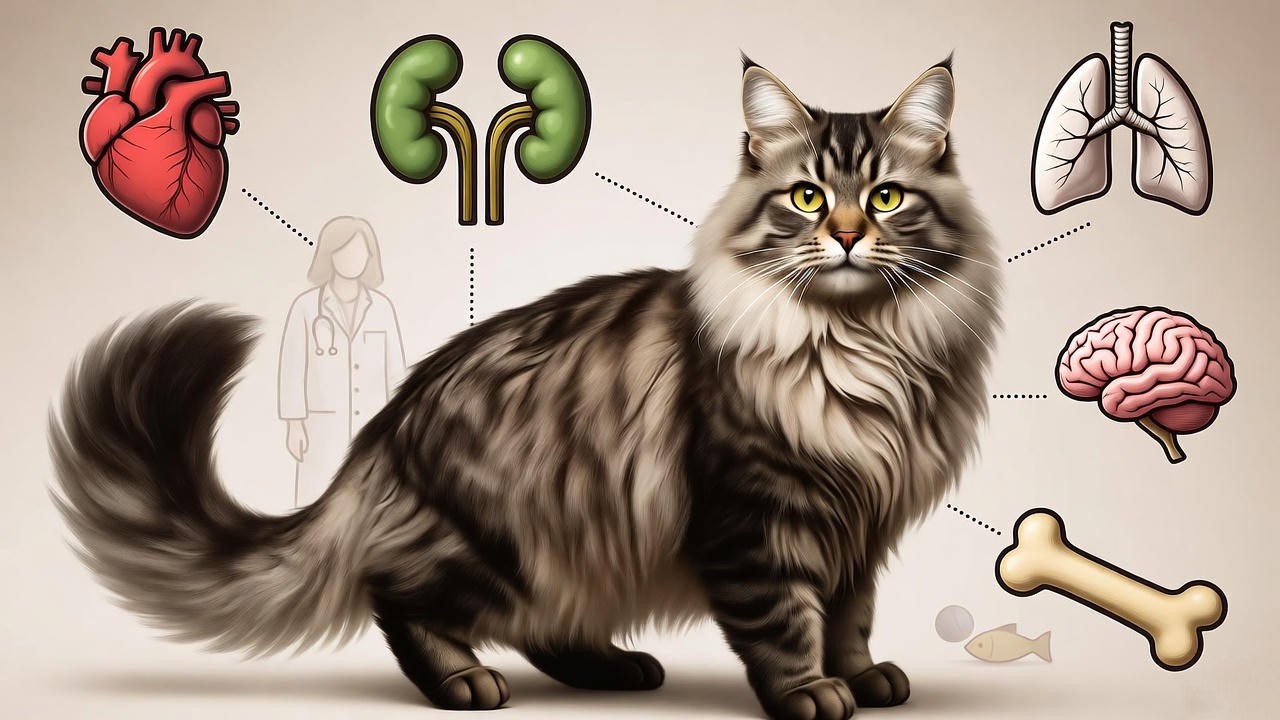
These majestic felines, known for their size and friendly nature, can face specific health challenges. Understanding these issues is key to ensuring your furry friend leads a long and happy life. We’ll uncover the common health concerns that Maine Coons may encounter.
You’ll discover essential tips on prevention and early detection, empowering you to take proactive steps for your cat’s well-being. Dive in to find out how you can keep your beloved Maine Coon healthy and thriving.
Common Health Problems
Maine Coon cats are adored for their gentle nature and majestic appearance. They are generally healthy, but like all breeds, they can face specific health challenges. Knowing the common health problems helps owners provide better care. Early detection can make a difference in treatment and management. Understanding these issues ensures a healthier life for these beloved felines.
Hip Dysplasia
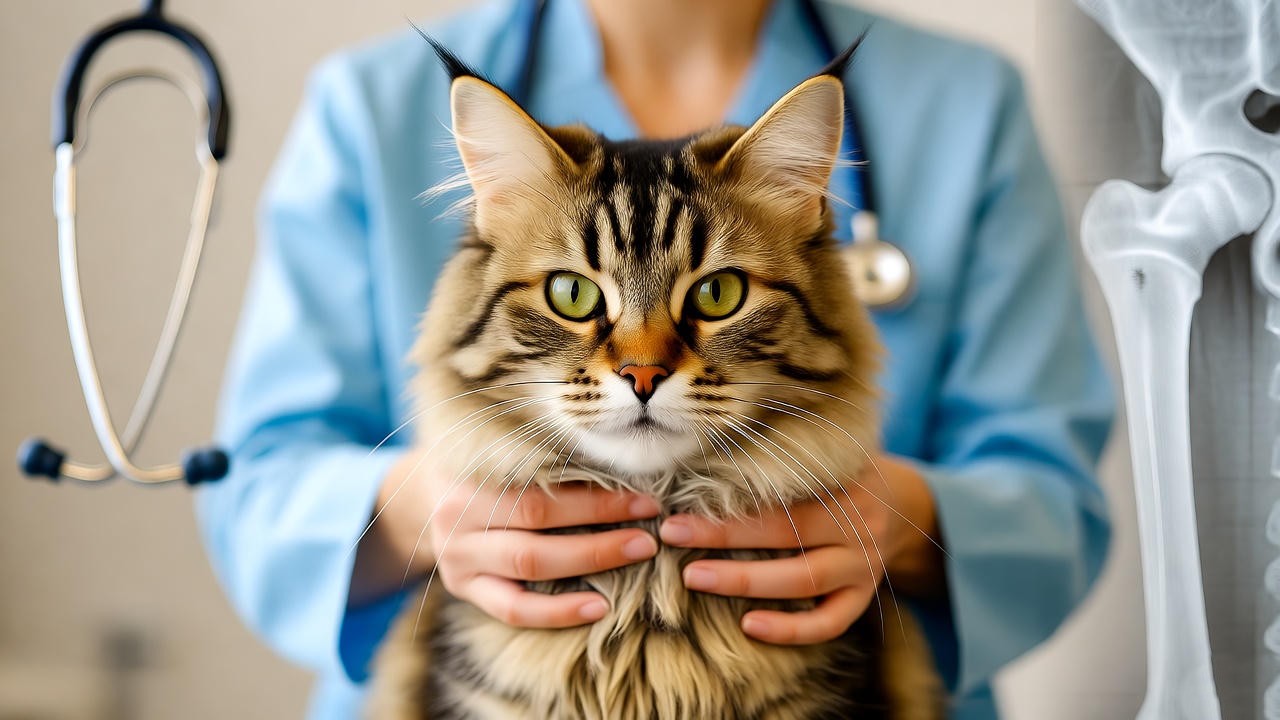
Hip dysplasia affects the hip joint of Maine Coon cats. It leads to pain and reduced mobility. This condition is hereditary and can worsen over time. Symptoms include difficulty walking and reluctance to jump. Regular veterinary check-ups can help manage this condition.
Hypertrophic Cardiomyopathy
Hypertrophic Cardiomyopathy (HCM) is a common heart disease in Maine Coons. It causes the heart muscle to thicken, affecting its function. Cats with HCM may show signs like breathing difficulties or lethargy. Early diagnosis is crucial for treatment. Regular heart screenings are recommended.
Spinal Muscular Atrophy
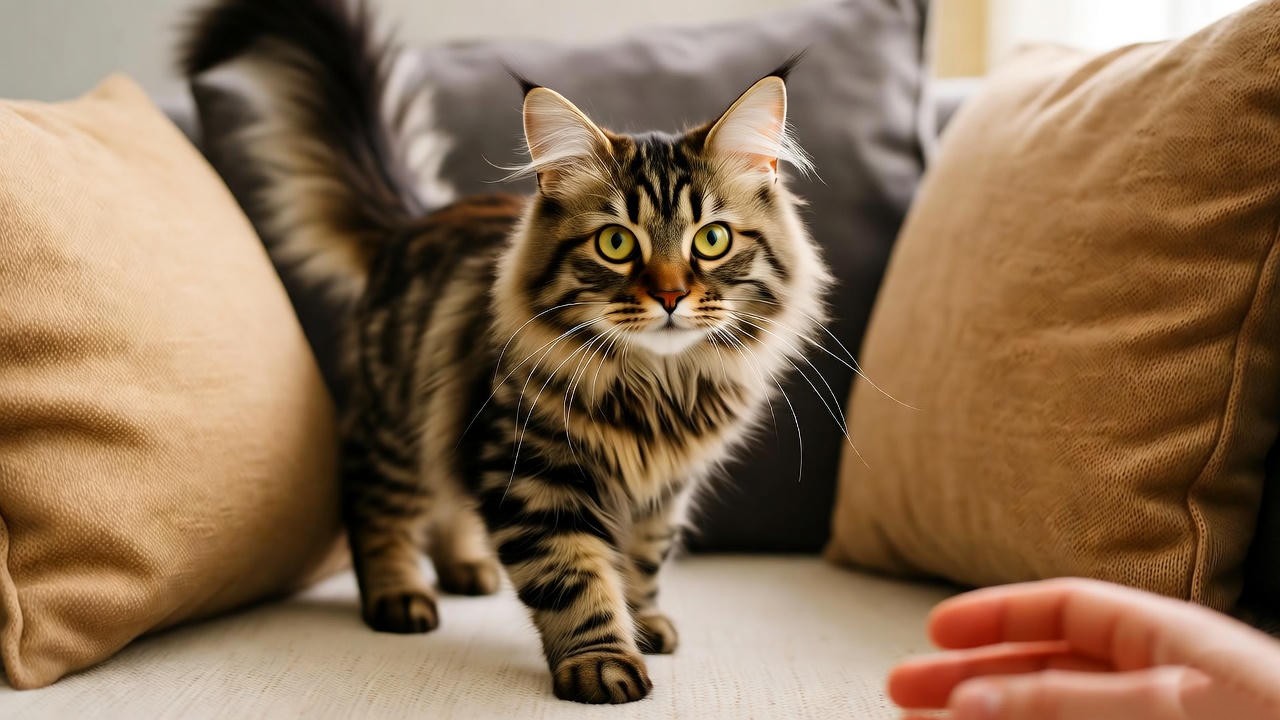
Spinal Muscular Atrophy (SMA) is a genetic disorder impacting muscle control. It results in muscle weakness and coordination issues. Maine Coons with SMA often have a wobbly gait. There is no cure, but supportive care can improve their quality of life.
Polycystic Kidney Disease
Polycystic Kidney Disease (PKD) affects the kidneys with cyst formation. It leads to kidney failure if untreated. Symptoms include increased thirst and weight loss. Early intervention with a vet can manage symptoms effectively. Regular monitoring is essential for cats at risk.
Recognizing Symptoms
Spotting signs of health issues in Maine Coon cats can be crucial for their well-being. Watch for changes in appetite, behavior, or coat condition. Early detection helps in managing common problems like obesity or heart disease effectively.
Recognizing symptoms of health issues in Maine Coon cats is crucial. Early detection can save your feline friend from discomfort and complications. Understanding behavioral and physical changes helps in identifying potential health concerns. Regular check-ups ensure your cat’s well-being.
Behavior Changes
Changes in behavior are often the first signs. Is your Maine Coon less active or playful? Does it seem more aggressive or withdrawn? Sudden shifts in behavior can indicate illness. A normally friendly cat becoming irritable might be in pain. Increased hiding or unusual vocalization may suggest stress or discomfort. Pay attention to these subtle changes.
Physical Indicators
Physical signs are easier to spot. Look for changes in appetite or weight. Noticeable weight loss or gain can indicate health issues. Check for unusual discharge from eyes or nose. Scratching or biting at skin might suggest allergies or parasites. Monitor your cat’s coat condition. Dull fur or excessive shedding could signal nutritional deficiencies.
Regular Check-ups
Routine vet visits are essential for Maine Coon health. Regular check-ups help catch issues early. Vets can spot problems before they become serious. Schedule annual health assessments for your cat. These visits ensure vaccinations are up to date. Discuss any changes you’ve noticed with your vet. They can offer advice and treatment if needed. Regular vet visits are a proactive step in maintaining your cat’s health.
Diet And Nutrition
Maine Coon cats often face health issues that can be managed with proper diet and nutrition. Balanced meals help prevent obesity, a common problem in this breed. Providing essential nutrients and maintaining a healthy weight contribute to overall well-being.
Maine Coon cats, known for their majestic appearance and playful personality, deserve the best care, especially when it comes to diet and nutrition. A proper diet is crucial not just for maintaining their luxurious coat but also for preventing common health issues.
Balanced Diet
The foundation of your Maine Coon’s health lies in a balanced diet. This means providing a mix of high-quality proteins, fats, and carbohydrates. Consider a mix of wet and dry food to keep their meals interesting while ensuring they get all necessary nutrients. One evening, I noticed my Maine Coon, Whiskers, seemed unusually lethargic. A quick visit to the vet revealed his diet was lacking in protein. This taught me the importance of checking food labels and opting for brands that list real meat as the primary ingredient. Would you know what’s in your cat’s bowl?
Supplements
Sometimes, even a balanced diet might need a little boost with supplements. Maine Coons can benefit from omega fatty acids for their skin and coat health. Adding supplements like fish oil can make a noticeable difference in their fur texture and shine. I started adding a few drops to Whiskers’ meals, and within weeks, his coat was shinier and healthier than ever. Have you considered how supplements could enhance your cat’s well-being?
Hydration Needs
Water is just as essential as food. Maine Coons are prone to urinary tract issues, making hydration crucial. Always ensure that fresh water is available. Cats often prefer running water, so a cat water fountain might be a worthy investment. Whiskers became significantly more interested in drinking once I introduced a fountain. Could this simple change be the key to your cat’s hydration success? A balanced approach to diet, supplements, and hydration is vital for maintaining the health and happiness of your Maine Coon. Every choice you make in their diet impacts their well-being. What’s your next step for ensuring they live their healthiest lives?
Exercise And Activity
Maine Coon cats need regular exercise to stay healthy. Their large size requires more activity than smaller breeds. Without exercise, they can become overweight and face health issues. Engaging them in physical activity is crucial for their well-being. It also helps in maintaining a healthy weight.
Suitable Exercises
Interactive toys are great for Maine Coons. They enjoy chasing balls or feather toys. Use a laser pointer for fun playtime. These activities keep them active and entertained. Climbing structures are also beneficial. They love to climb and explore high spaces. A cat tree is a perfect addition to your home.
Mental Stimulation
Mental stimulation is as important as physical exercise. Puzzle toys are excellent for engaging their minds. Rotate toys to keep their interest alive. Hide treats around the house for a fun treasure hunt. This keeps their minds sharp and curious.
Indoor Vs Outdoor Activity
Indoor activity can be safe and fulfilling for Maine Coons. With proper toys and space, they can be active indoors. Outdoor activity needs supervision to avoid risks. A secure yard or a leash can provide safe outdoor experiences. Monitor them closely to ensure safety.
Preventive Healthcare
Maine Coon cats often face health challenges like hip dysplasia and heart disease. Regular vet check-ups are crucial. Keeping their weight in check helps prevent joint issues.
Maine Coon cats are known for their majestic appearance and friendly demeanor, making them a popular choice among pet owners. However, ensuring their health requires a proactive approach. Preventive healthcare plays a crucial role in maintaining the well-being of your Maine Coon. By focusing on vaccinations, parasite control, and dental care, you can significantly enhance their quality of life and longevity.
Vaccinations
Vaccinations are vital for protecting your Maine Coon from various diseases. Regular vaccinations can shield your cat from illnesses like feline leukemia and rabies. Consult with your veterinarian to set up a vaccination schedule tailored to your cat’s needs. Missing a vaccination can leave your cat vulnerable. Remember the time your Maine Coon caught a cold after missing their booster shot? Avoid this by keeping their vaccinations up-to-date. Your vet can provide a handy reminder system to ensure you never miss an appointment.
Parasite Control
Parasites such as fleas, ticks, and worms can wreak havoc on your Maine Coon’s health. Regular treatments can prevent these pesky intruders from causing harm. Invest in quality flea and tick prevention products to keep these parasites at bay. Consider the distress of seeing your cat scratching incessantly due to fleas. Don’t let this be your Maine Coon. Regularly inspect their fur and skin, especially during warmer months. Talk to your vet about a year-round parasite prevention plan for your furry friend.
Dental Care
Dental health is often overlooked but is crucial for your Maine Coon. Poor dental hygiene can lead to gum disease and tooth loss. Regular brushing and dental check-ups can help maintain your cat’s oral health. Imagine the discomfort of having a toothache—your cat feels it too. Introduce dental care routines early, such as using cat-friendly toothpaste and brushes. Does your Maine Coon resist? Try dental treats and toys designed to reduce plaque build-up. By prioritizing preventive healthcare, you can ensure your Maine Coon remains healthy and happy. What steps will you take today to protect your feline companion?
Grooming And Maintenance
As a Maine Coon cat owner, you know that grooming and maintenance are crucial to keeping your feline friend healthy and happy. These gentle giants boast magnificent coats, sturdy nails, and sensitive ears, all requiring regular care. Let’s dive into the specifics of each, ensuring your Maine Coon remains in tip-top shape.
Coat Care
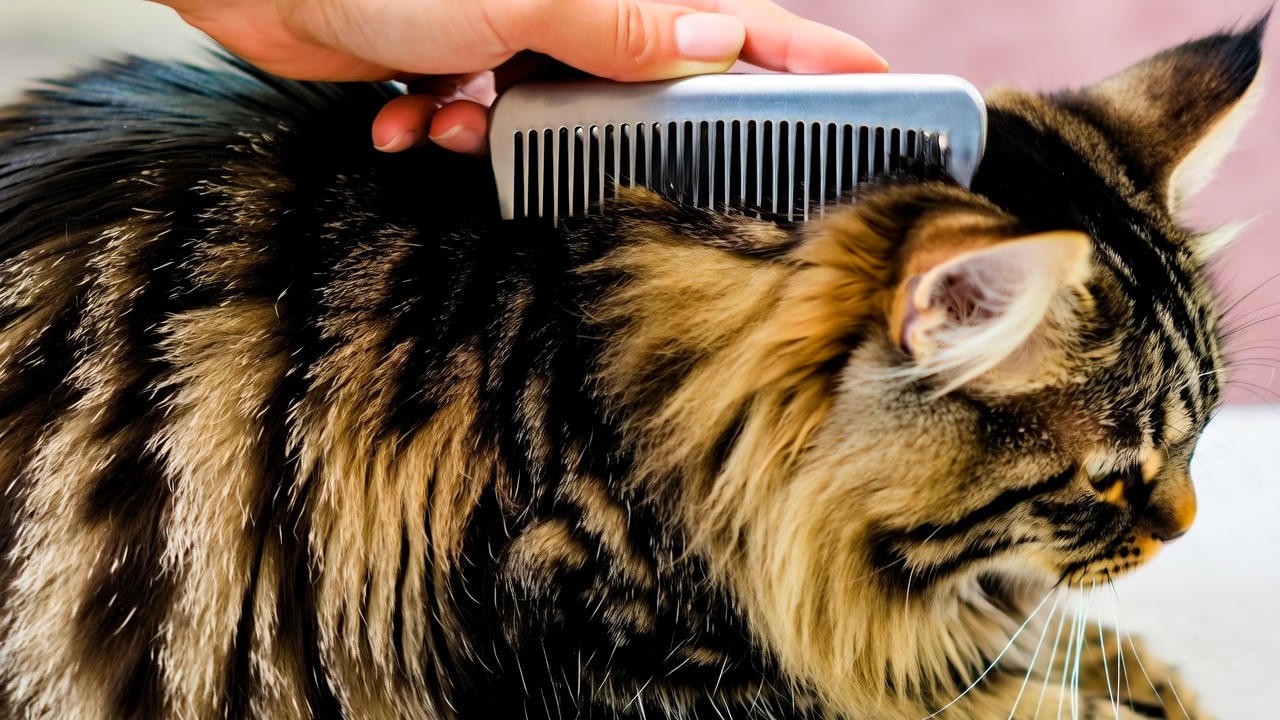
Maine Coons have long, thick fur that can become tangled if not brushed regularly. Use a wide-toothed comb to gently remove knots and prevent matting. Aim to brush your cat’s coat at least twice a week.
Have you ever noticed how a well-groomed coat enhances your cat’s personality? Keeping their fur clean not only reduces shedding but also boosts their confidence. Consider using a detangling spray for stubborn knots.
Avoid neglecting this task. Tangled fur can lead to skin issues. Regular coat maintenance is your secret weapon against these problems.
Nail Trimming
Long nails can be uncomfortable for your Maine Coon and can cause damage to your furniture. Trim your cat’s nails every two weeks using a cat-specific nail clipper.
It’s easy to feel nervous about trimming nails, but practice makes perfect. Remember to cut just the tip and avoid the pinkish area known as the quick. If you’re unsure, consult your vet.
Have you noticed how much calmer your cat is with trimmed nails? Regular nail maintenance can prevent painful snags and tears, keeping your pet comfortable.
Ear Cleaning
Maine Coons are prone to ear wax buildup, which can lead to infections. Check your cat’s ears weekly. Use a damp cotton ball to gently wipe away any dirt or wax.
Ever wondered why your cat shakes their head often? Excess earwax could be the culprit. Keeping their ears clean can prevent discomfort and potential health issues.
Don’t forget to reward your cat with a treat after ear cleaning. Positive reinforcement makes them more cooperative during grooming sessions.
Are you giving your Maine Coon the grooming care they deserve? Regular maintenance is key to a happy, healthy cat. Adopt these practices and watch your feline friend thrive.
Emergency Care
Emergency care is crucial for Maine Coon cats. Timely intervention can save lives. Owners should be prepared for sudden health issues. Understanding emergency signs and actions can make a difference. This guide covers essential aspects of emergency care for your beloved feline.
Identifying Emergencies
Recognizing signs of distress is vital. Look for unusual behaviors. Loss of appetite, difficulty breathing, or lethargy are red flags. Sudden vomiting or diarrhea should not be ignored. Bleeding or seizures require immediate attention. Always stay calm when assessing these signs.
First Aid Basics
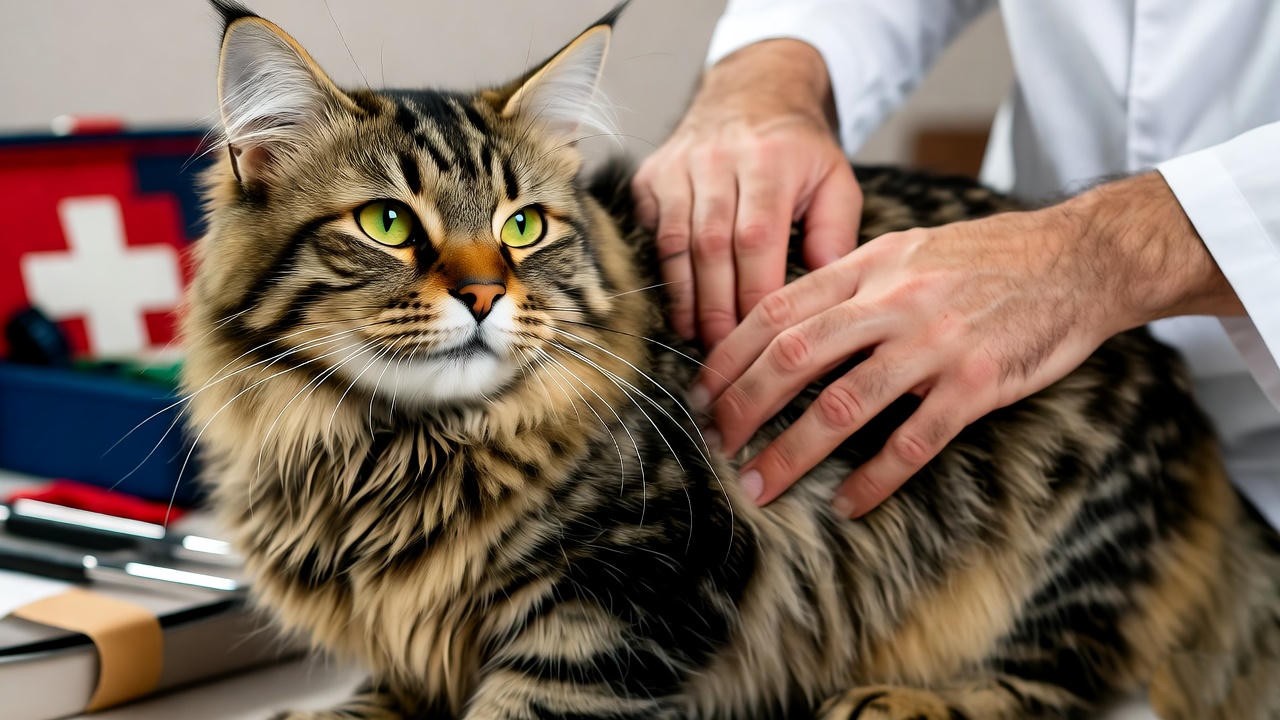
Basic first aid can stabilize your cat. Gently restrain your pet if necessary. Use a soft towel for support. For bleeding, apply pressure with a clean cloth. Keep your cat warm and comfortable. Ensure breathing is steady. Avoid offering food or water in critical moments.
Seeking Veterinary Help
Contact a vet as soon as possible. Describe symptoms clearly and concisely. Follow any advice given over the phone. Transport your cat safely to the clinic. Use a secure carrier for travel. Stay calm and focused during the journey. Trust your vet’s expertise for further care.
Frequently Asked Questions
What Are Common Maine Coon Health Problems?
Maine Coons can face several health issues. Common problems include hypertrophic cardiomyopathy, hip dysplasia, and polycystic kidney disease. Regular veterinary check-ups are essential to detect these early. A balanced diet and maintaining a healthy weight can also help in prevention and management of these conditions.
How Can I Prevent Maine Coon Health Issues?
To prevent health issues, ensure regular vet visits and vaccinations. Provide a balanced diet rich in nutrients. Regular exercise helps maintain a healthy weight. Genetic testing can identify inherited conditions early. Grooming and dental care are also crucial for preventing common problems in Maine Coons.
Are Maine Coons Prone To Dental Problems?
Yes, Maine Coons can develop dental issues like periodontal disease. Regular brushing and dental check-ups are vital. Providing dental treats and toys can help maintain oral health. A balanced diet and proper hydration also contribute to preventing dental problems in Maine Coons.
How Often Should Maine Coons Visit The Vet?
Maine Coons should visit the vet at least once a year for routine check-ups. Regular visits help in early detection of potential health issues. Vaccinations and preventative care are crucial. Older or at-risk cats might need more frequent visits to monitor their health closely.
Conclusion
Caring for a Maine Coon requires awareness of their health needs. Regular vet check-ups are crucial. These cats can face specific health issues. Hip dysplasia and heart disease are common. A balanced diet supports their well-being. Keep their weight in check to prevent joint strain.
Exercise is important for their physical health. Always stay informed about their health requirements. A healthy Maine Coon is a happy companion. With proper care, they can thrive and enjoy a long life. Your Maine Coon deserves the best care possible.
